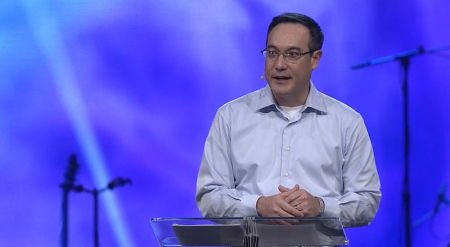Urbana 2018: 3 habits for building relationships, sharing the Gospel in a divisive world

The world has always been a divisive place but Christians are called to lead the way in bringing transformation to people’s lives by reflecting Christ’s love with confidence and compassion, said John Inazu at Urbana’s Student Missions Conference.
Believers must engage people despite our disagreements or fear of hostility and condemnation, he said, stressing that the Gospel “is less about us and our own likability than it is about the Creator to whom we point.”
“When I speak of confidence, I do not mean certainty. I don’t think that faith means certainty. ‘You have believed because you have seen Me,’ Jesus says to Thomas after the resurrection. But ‘blessed are those who have not seen and have yet believed,’” Inazu said, quoting from the Gospels before thousands of students at the annual conference in St. Louis, Missouri. “Faith without certainty is how we live in the world.”
Believers can embody a blend of confidence and compassion by exhibiting three postures, he said, which are: humility, patience and tolerance.
“Humility means knowing that when it comes to some of our most deeply held beliefs we will not always be able to prove to other people who think differently why we are right and they are wrong,” Inazu said. “This does not shake our confidence in our beliefs, but calls for a recognition that some of our beliefs stem from contested premises that others do not share.”
“Christians do not celebrate all differences about ultimate things,” he added, reflecting on his friendship with an atheist and how their disagreements over sports teams is far different than opinions on salvation through Jesus Christ. “Humility can lead to greater empathy, but the goal is not to minimize the reality of our differences.”
The second posture he listed is patience. “Patience requires listening well and sticking with hard relationships.” Taking time to listen to someone doesn’t constitute acceptance or agreement, however. But it does mean that you’re not being dismissive.
“It might turn out that my patient listening to you leads me to conclude that you were just as wrong as I thought you were,” said Inazu whose book, Confident Pluralism: Surviving and Thriving Through Deep Difference, shows how we can better interact with people who hold different worldviews and values.
“With enough patience you will find that other people, God’s image bearers, almost always have something to teach you.”
The final posture is tolerance. “Tolerance is the idea that we allow for others to pursue their own beliefs and practices, even those we find objectionable,” he said, explaining that, like patience, tolerance is not the same as approval.
“Parsing the difference between tolerance and approval requires the hard work of distinguishing between people and ideas. Tolerance asks that we treat people with respect, it does not mean that we respect all ideas,” explained Inazu, who’s the executive director of the Carver Project, an initiative developed by Christian faculty committed to maintaining a faithful presence in higher education, and serves also on InterVarsity’s board of trustees.
Citing the book of Revelation, the last book in the Bible, Inazu noted that at the beginning the phrase “patient endurance” is there five different times. “We endure hardships, but we also endure differences that make us uncomfortable. So in some ways, our tolerance is facilitated by our patience. And perhaps a posture of humility reinforces our patient endurance with those with whom we disagree by reminding us of our shared humanity and mutual dependence on one another.”
These three postures don’t come naturally to most people, including Inazu, he acknowledged, describing himself as a snarky person by nature.
“We have to practice these postures,” he said, suggesting that a great place to do that is on social media — Twitter, Facebook and Instagram — where he, too, is learning to apply humility, patience and tolerance partly by deciding not to send many of the posts he writes and filing them away instead.
Inazu also encouraged students to not only think about global missions but to also think about the work they can do in their own neighborhoods by getting to know people well enough to know their challenges. This also means focusing on common interests before delving into painful disagreements.
“Jesus doesn’t tell us to tolerate our enemies. He commands us to love them. And thank God that He does not merely tolerate us. He embraces us across the greatest difference of all. …
"Let us be people who speak and act in the world with humility, patience and tolerance,” he said, "because our thoughts, our actions, and our lives are characterized by faith, hope and love.”
Urbana Student Missions Conference is InterVarsity's triennial event where tens of thousands of college students and others are encouraged to seek God’s voice and join the global missions movement in spreading the Gospel. This year's event took place on Dec. 27 and concluded on Monday.





















